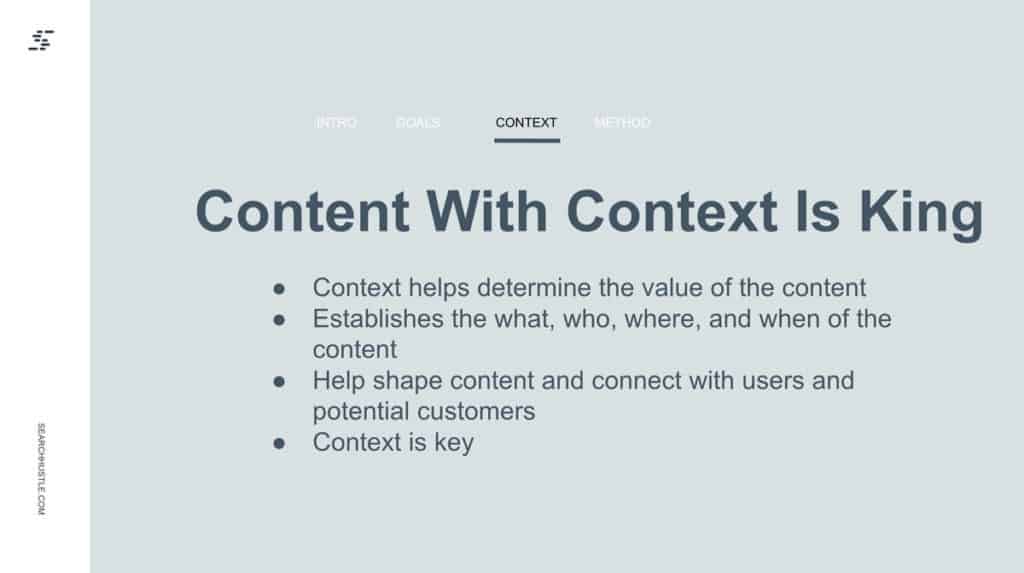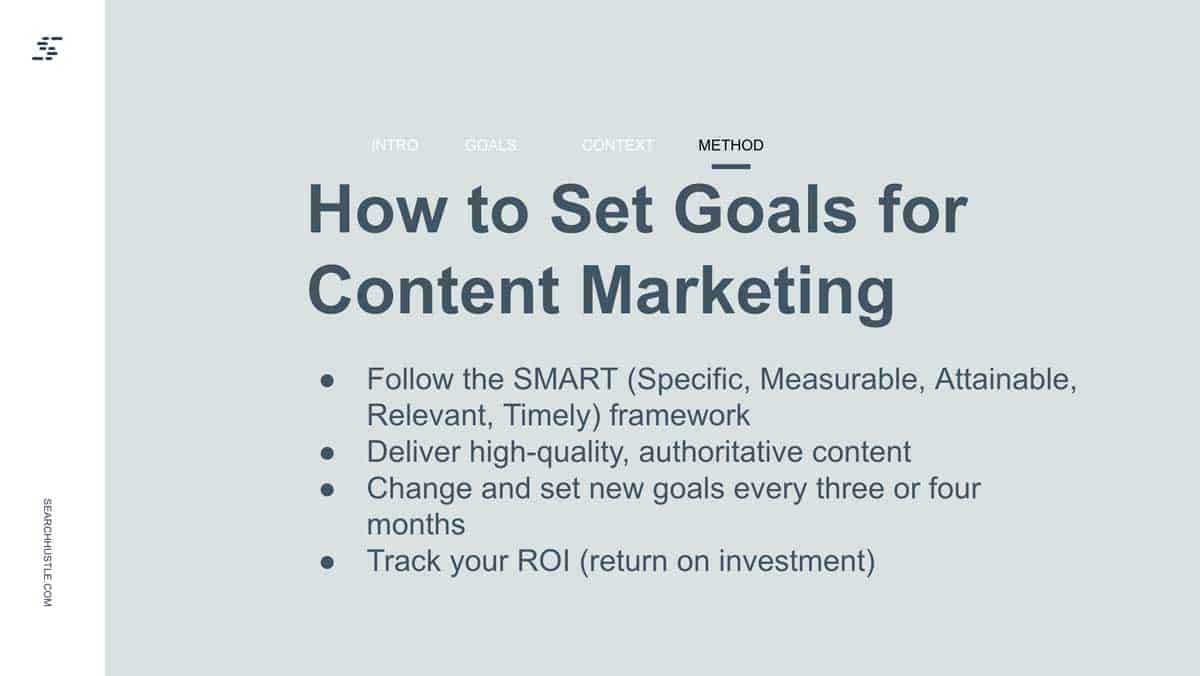Setting Goals
Setting goals is vital to success, as it gives an objective to strive for and a metric to track progress against.
In a later section, we will discuss what metrics are best used to measure success.
In the end, the goal of any marketing remains to improve business. Content marketing has general goals that you should always track. Achieving these goals should form the cornerstone for why the marketing campaign is undertaken in the first place.


Content With Context Is King
Some say that content is king, and context is queen when it comes to digital marketing. The reality is, content without context is almost always useless. Content can be anything, but in what context it is delivered is what determines its value. Context establishes the what, who, where, and when of a piece of content.
It is through this context that content takes shape and can actually connect with users and potential customers. For instance, the price of a board is an interesting piece of information, but in context will help describe how much a building may cost, or how much a renovation will be. It is the context that is key.
Top 5 Goals for Content Marketing
In the end, the goal of any marketing remains to improve business. Content marketing has five general goals which will help to improve any business. Achieving these goals should form the cornerstone as to why the marketing campaign is undertaken in the first place.
Revenue
In the world of business, revenue is what truly matters. Everything goes back to making money because without making money there can be no company or marketing campaign at all. Good content marketing improves revenue by itself but also by achieving the other four goals.
While revenue doesn’t exist in a vacuum, it is important to monitor it separately from profit. The goal of any marketing campaign is to reach more customers which will, directly and indirectly, increase the amount of revenue taken in by a company.
Lead Generation
Content marketing generates leads by building interest and developing answers to customer and reader inquiries. It draws potential customers to a business to learn more about its services and products. Solutions and understanding can snare even the most hardened consumer.
This is why high-quality content that offers authoritative knowledge and information is vital. You want to speak to the customers directly so they know that whatever their problem or need, you have the right solution for them.
Lead Scoring
Since so many metrics can lead to a greater understanding of the market and users, lead scoring is vital. This rates how important and impactful the leads generated are. It will tell you how likely the leads will result in additional sales or interest in products and services.
The better a lead, the higher score it will be given. This is done using a numerical system so that the quality of each lead can be quickly and easily understood.
A successful content marketing campaign will always increase brand awareness. It will provide content that doesn’t just attract readers but also informs them about the company in question; and what the company can bring to the table to solve the problems or needs of its customers.
This way, potential customers become more aware of the products and services offered. As people start sharing the content, more people will recognize the brand.
User Engagement
Content marketing aims to increase interactions between customers and companies. Of course, any interaction increases user engagement. This can be anything from leaving reviews to asking questions and reaching out through social media.
Building this interconnectivity between a consumer and a company has many advantages. It will lead to more revenue in the end, but it also leads to more brand loyalty and the humanization of the company itself.

How to Set Goals for Content Marketing
Content marketing is designed to increase interaction, brand awareness, and other key metrics between a company and consumers. Your goals should follow the SMART rubric, meaning that they need to be specific, measurable, attainable, relevant, and timely.
The goals you choose will have a big impact on how your strategy unfolds. Try using goals that will require work to reach, but are achievable. Don’t select goals that will take an abnormally long amount of time or some unforeseen stroke of luck to achieve.
The overall goal should always be to deliver high-quality, authoritative content that establishes interest in the products and services provided. Establish goals based on the content itself and how many interactions, new customers, and improved conversion rates.
Change and Set New Goals Every Three or Four Months
A good goal should be reached in a timely manner. This means that each goal is another step in a ladder towards success and increased revenue. Every three or four months take the time to evaluate how successful the last goal was and then plan accordingly.
This will keep goals realistic while also allowing improvements to the content marketing to be made that will improve results. Take special care to analyze every aspect of your previous goals and how the metrics were impacted by various activities.
Track Your ROI (Return on Investment)
It is of vital importance to understand the relationship between investment in content marketing and the return that the business is receiving. This information is critical because it can justify the content-marketing campaign, or reveal that changes need to be made.
An ROI of 5:1 is considered good for any business, and if you can exceed this it might even be considered exceptional (When it comes to multipliers each industry is different – look for benchmarks). Don’t try for unrealistic numbers, make sure that you track the ROI and manage expectations related to it. No marketing strategy is a silver bullet, but it is important to prove the worthiness of any campaign.
Make sure to keep track of every dollar spent on marketing, and then compare it to the increases that have been seen during the same period of time. This is a great way to highlight not only the success of a marketing campaign but also to exhibit clear and concise data.
Goals Drive Us To Success And The Future
Proper goals can make an amazing difference. Without a proper goal, it is difficult to manage expectations and lead an understandable marketing strategy. Goals give the energy required to reach for better and better results.
Let the goals of a marketing campaign define the energy and momentum of that campaign. Achievement and success go hand in hand, and a great goal or set of goals will always be able to reveal this to those involved and those benefiting.

Ready to Take Your Search Hustle Further?



